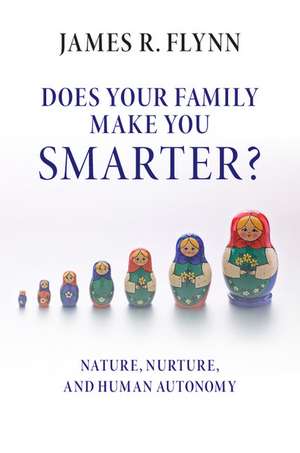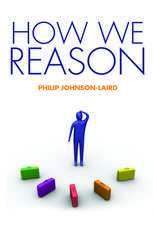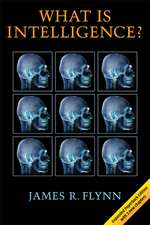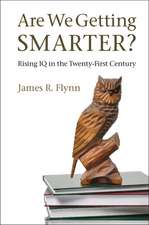Does your Family Make You Smarter?: Nature, Nurture, and Human Autonomy
Autor James R. Flynnen Limba Engleză Paperback – 30 mai 2016
Preț: 182.27 lei
Nou
Puncte Express: 273
Preț estimativ în valută:
34.88€ • 36.42$ • 28.80£
34.88€ • 36.42$ • 28.80£
Carte disponibilă
Livrare economică 25 martie-08 aprilie
Preluare comenzi: 021 569.72.76
Specificații
ISBN-13: 9781316604465
ISBN-10: 1316604462
Pagini: 272
Ilustrații: 1 b/w illus. 33 tables
Dimensiuni: 152 x 228 x 15 mm
Greutate: 0.45 kg
Editura: Cambridge University Press
Colecția Cambridge University Press
Locul publicării:Cambridge, United Kingdom
ISBN-10: 1316604462
Pagini: 272
Ilustrații: 1 b/w illus. 33 tables
Dimensiuni: 152 x 228 x 15 mm
Greutate: 0.45 kg
Editura: Cambridge University Press
Colecția Cambridge University Press
Locul publicării:Cambridge, United Kingdom
Cuprins
Part I. Human Autonomy: 1. Twins and autonomy; 2. Justice and freedom; 3. The great debate; 4. Slow and quick decay of family effects; 5. Reconciliation with twins and adoptions; 6. The fairness factor; Part II. Intelligence: 7. The Raven's revolution; 8. Learning from astronomy; 9. The meta-theory of intelligence; 10. Scientific theories of intelligence; 11. Psychology and Cardinal Bellarmine; Appendices.
Recenzii
'Another superb piece of work by the best mind in the business. The analysis of data is penetrating, the elaboration of its meaning highly illuminating, and the discourse on theories of intelligence is a feast for the mind.' Thomas J. Bouchard, Jr
'Another amazing analysis of IQ data by James Flynn! As author of the Stanford-Binet 5, I have admired Flynn's work for many years. I highly recommend his new book that shines new light on the life-course of intelligence.' Gale H. Roid, author of the Stanford-Binet Intelligence Scale, 5th edition
'James Flynn takes up one of the most important questions in the social sciences - what is left of human autonomy in the genomic age? - and lays out the optimistic case with full acknowledgment of the technical difficulties his argument must surmount. This is the way that we are going to make progress: by engaging an evolving state of knowledge with logic and data, transparently clear prose, and unfailing civility.' Charles Murray, co-author of The Bell Curve
'Few intellectuals have grappled honestly with the problems surrounding the causes and effects of intelligence, and fewer still have done so with as much incisiveness and originality as James Flynn.' Steven Pinker, Harvard University, Massachusetts
'Professor Flynn has a remarkable ability to explain complex concepts in a way so rational and logical that it seems, after the event, we should be kicking ourselves for overlooking the obvious. His chapter on the Raven's Progressive Matrices is brilliant.' John Rust, Director of The Psychometrics Centre, University of Cambridge, and co-author of Raven's Progressive Matrices
'James Flynn, as much as anyone, can take credit for ushering in the age of enlightenment in our understanding of the nature of human intelligence. In this latest chapter, we learn how our families can either advantage or disadvantage us, and how our choices can either foster or impede our intellectual performance.' Joshua Aronson, New York University
'This is a brilliant book that anyone will want to read who is even remotely interested in intelligence and what variables affect it. Its take-home message is extremely powerful for people of any age - that they have serious control over their intelligence through the environments they select …' Robert J. Sternberg, PsycCRITIQUES
'Another amazing analysis of IQ data by James Flynn! As author of the Stanford-Binet 5, I have admired Flynn's work for many years. I highly recommend his new book that shines new light on the life-course of intelligence.' Gale H. Roid, author of the Stanford-Binet Intelligence Scale, 5th edition
'James Flynn takes up one of the most important questions in the social sciences - what is left of human autonomy in the genomic age? - and lays out the optimistic case with full acknowledgment of the technical difficulties his argument must surmount. This is the way that we are going to make progress: by engaging an evolving state of knowledge with logic and data, transparently clear prose, and unfailing civility.' Charles Murray, co-author of The Bell Curve
'Few intellectuals have grappled honestly with the problems surrounding the causes and effects of intelligence, and fewer still have done so with as much incisiveness and originality as James Flynn.' Steven Pinker, Harvard University, Massachusetts
'Professor Flynn has a remarkable ability to explain complex concepts in a way so rational and logical that it seems, after the event, we should be kicking ourselves for overlooking the obvious. His chapter on the Raven's Progressive Matrices is brilliant.' John Rust, Director of The Psychometrics Centre, University of Cambridge, and co-author of Raven's Progressive Matrices
'James Flynn, as much as anyone, can take credit for ushering in the age of enlightenment in our understanding of the nature of human intelligence. In this latest chapter, we learn how our families can either advantage or disadvantage us, and how our choices can either foster or impede our intellectual performance.' Joshua Aronson, New York University
'This is a brilliant book that anyone will want to read who is even remotely interested in intelligence and what variables affect it. Its take-home message is extremely powerful for people of any age - that they have serious control over their intelligence through the environments they select …' Robert J. Sternberg, PsycCRITIQUES
Notă biografică
Descriere
A new method of estimating what affects IQ shows that life history and choice count toward your level of intelligence.











